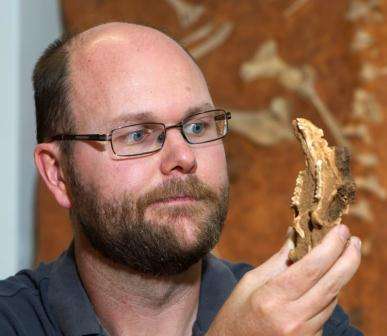Fossils give glimpse into future

A Flinders University researcher is digging up the past to solve problems of the future.
As part of his PhD, School of Biological Sciences student Matthew McDowell (pictured) has been unearthing fossils from Kelly Hill Cave on Kangaroo Island and South Australia's peninsulas to determine the impact that climate change and rising sea levels have had on Australian native animals.
The research has involved an analysis of mammal bones buried in multiple layers of cave dirt, providing insights into how animals which lived in the area have changed with environmental conditions over time.
"As many of the animals we unearthed are still alive today, we know the environmental conditions they prefer – some animals like hot and dry deserts, others may prefer a wet forest," Mr McDowell said.
"Animals which lived around the cave in the past either fell in or were eaten by owls that roosted in the cave where they disgorged the bones of their prey," he said.
"By identifying some 30,000 individual bones we've been able to interpret how the animals responded to environmental change over the last 40,000 years.
"We found that the oldest fossils mainly belonged to animals which live in dry heath vegetation today but that the youngest fossils were mainly from animals that currently live in forests or woodlands. The taller vegetation suggests climatic conditions have become wetter with time."
Mr McDowell said his research suggests that native mammals were resilient to climate change, however rising sea levels posed a problem.
"Only three species disappeared during the driest period recorded but within a thousand years of isolation due to sea level rise, 14 native mammals disappeared.
"The island biogeography theory predicts that as an area gets smaller the number of species that can survive gets smaller too and we found that prediction was pretty accurate."
He said the overall aim of the study was to find new and improved ways to protect Australia's native animals.
"Islands are like an analogue for national parks, and what we can learn from islands can be applied to park management.
"Unfortunately the vast majority of national parks aren't big enough to maintain animals over the long term, by which I mean thousands of years, so it's really important that we maintain animal populations on private as well as public property and allow them to move between those areas and their habitat."
Mr McDowell was a winner of Flinders University's 2012 Best Student Paper Awards, an annual competition which aims to recognise and reward outstanding student research.
Provided by Flinders University




















